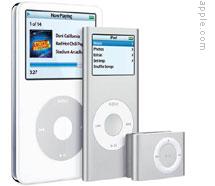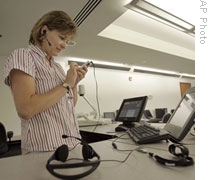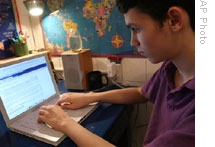-
(单词翻译:双击或拖选)
The growth of the Internet has led to new technologies. Many are being used today to create valuable learning environments in education. Transcript1 of radio broadcast:
24 June 2008
VOICE ONE:
I'm Faith Lapidus.
VOICE TWO:
And I'm Steve Ember with EXPLORATIONS in VOA Special English. Today we finish our three-part series about communications.
(MUSIC)
VOICE ONE:
In our first two programs we discussed the history and importance of communicating information. We talked about the development of the Internet. This has made it possible for almost anyone with a computer to share in what is called the Information Age.
Research shows that the Internet's World Wide Web is especially popular with young people. As a result, colleges and universities are recognizing the learning gains that can be made with Web-based instructional technology. For example, George Mason University in Fairfax, Virginia offers its professors training in instructional technology. G.M.U. teachers can learn how to use the latest Web tools to improve their classes.
VOICE TWO:
 |
| Rick Reo |
Rick Reo is an instructional designer at the university. He says the education profession has entered the Web 2.0 period. He says Web 2.0 is a marketing2 term that defines3 a renewal4 of the Web since the start of the twenty-first century. Any kind of Web-driven tool that is interesting, useful, easy to learn and free is Web 2.0, says Rick Reo.
VOICE ONE:
One such tool is a social networking service. This is a Web site that helps people find others like themselves, create personal identities, exchange resources and work together. Facebook and MySpace are two social networking Web sites popular in the United States and around the world.
Educause is a nonprofit organization that supports the use of information technology in education. The group says up to ninety percent of American college students have created Facebook Web sites. Social networking sites also provide teachers a way to reach their students outside of the classroom. Rick Reo says students use Facebook or MySpace as often as they check their university e-mail.
VOICE TWO:
Social bookmarking is another Web 2.0 technology that has many educational uses. Professors can use the tool when doing personal research. It can also add to classroom learning. When you save the address of a Web site that you want to visit again on your computer, you are bookmarking it. Social bookmarking sites let people store collections of bookmarks. These can be shared with other people or made private.
When you bookmark a Web site, you also tag the site with descriptive words. For example, you might tag the voaspecialenglish.com Web site with the words: English, teaching, learning, news and information. Tags help users organize their bookmarks. Users can also see how many other people have used a tag. And they can search for all resources that have been given that tag.
Rick Reo says social bookmarking is especially useful when creating a collection of resources to be shared with others. A biology teacher, for example, might ask her students to bookmark Web sites about flowers and plants. The students work collectively to create the list. When it is finished, the students have a group of resources that will help them finish their project.
(MUSIC)
VOICE ONE:
 |
| Different versions of Apple's iPod |
Podcasting is also a very popular instructional technology. The term was invented with the Apple company's iPod in mind. IPods are small digital audio players that permit users to download music from their computer directly to the device for listening later.
The term podcasting no longer relates only to the iPod. It involves any software and hardware combination that permits the user to download audio files and control when those files are heard. Anyone with a modern computer can create, make available and download a podcast from the Internet.
VOICE TWO:
 |
| Professor Suzan Harkness works with an iPod at the University of the District of Columbia in Washington. She can record lectures as podcasts. |
Podcasting also makes education transportable. Teachers can make their talks, or lectures, available to students who miss the class. Podcasts also let students hear what other experts have to say. Remember that biology teacher who asked her students to bookmark Web sites about flowers and plants? She might also ask her students to report about that collection of resources in a podcast.
Rick Reo says George Mason is one of many "iTunes universities" around the world. Apple has opened its iTunes store to universities. Podcasts created by the schools are stored on Apple's computer servers. Anyone can download the free educational material at Apple's iTunes store. Stanford, Yale, Duke, and the Massachusetts Institute of Technology are other universities offering audio and video downloads.
VOICE ONE:
Podcasts are fed to computers using a technology called RSS. Many creators of information on the Internet offer it directly to people using RSS feeds. Our biology teacher example might ask her students to register for RSS feeds from five popular science Web sites. To receive those feeds, students need to register for a free RSS reader, or aggregator. Google and MyYahoo both offer RSS readers.
Once the students register for a free RSS reader, a connection has to be made between the reader and the student's favorite science Web sites. Establishing these connections is called subscribing5. It is easy to do. Just look for an RSS sign on the site.
Using RSS technology helps people easily get new material from Web sites that interest them. Did you know that Special English offers RSS feeds? You can find a link to RSS on our Web site, voaspecialenglish.com.
VOICE TWO:
Wikis have also become a popular Web 2.0 technology in education. Let us go back to our biology class. Suppose the teacher decided6 to take her class on a camping trip to collect plants and flowers. The students would need to work collectively to decide what to bring on the trip. A wiki can help. A wiki is a Web site where anyone can create, edit7 or change information collected on the site. Audio, video and pictures can be added to a wiki as well.
VOICE ONE:
The most popular wiki on the Internet is Wikipedia. It is a free encyclopedia8 of information about people, places, things, events and ideas that anyone can write, add to or edit. Wikipedia was launched in two thousand one. Today, it includes more than ten million articles in more than two hundred fifty languages. More than two million articles are in English. Each article offers links to other Wikipedia articles or to other Web resources.
Educause reports that Wikipedia is the eighth most visited Web site in the United States. College students use it as a main research tool. However many schools look at the tool with a critical eye. That is because a person can put incorrect information on Wikipedia. The history school at Middlebury College, for example, has banned Wikipedia in student research. The ban was ordered after several students repeated the same wrong information from a Wikipedia article.
Other universities are using Wikipedia to teach students how to write without expressing an opinion. At Columbia University in New York City, professors have had their students create or edit Wikipedia articles to learn how to write in a neutral way.
VOICE TWO:
 |
| Eighth grader Eyck Freymann works on his political blog from his home in New York |
Perhaps the best known form of Web 2.0 activity is the Web log, or blog for short. There are reportedly more than one hundred million blogs around the world. A blog is an online collection of personal comments and links to other Web sites. Anyone can create a blog using sites like blogger.com or wordpress.com. Bloggers often work together in small communities. They read each other's posts, link to them or report what other bloggers say.
Each individual post on a blog can become a discussion through comments left by readers. There are personal blogs, political blogs and entertainment blogs, just to name a few. In higher education, professors use blogs to communicate their opinions or to create a discussion with other educators. Students are also using blogs for personal expression or as part of their classes.
VOICE ONE:
There are many other ways that information technology can be used in education. We have only reported about a few of them. For example, there are virtual9 worlds and gaming, Web-based self-publishing and photo-sharing. When it comes to information technology in higher education, Rick Reo at George Mason University says the sky is the limit.
(MUSIC)
VOICE TWO:
This program was written by Jill Moss10. It was produced by Mario Ritter. I'm Steve Ember.
VOICE ONE:
And I'm Faith Lapidus. Join us again next week for EXPLORATIONS in VOA Special English.
 收听单词发音
收听单词发音
1
transcript

|
|
| n.抄本,誊本,副本,肄业证书 | |
参考例句: |
|
|
|
2
marketing

|
|
| n.行销,在市场的买卖,买东西 | |
参考例句: |
|
|
|
3
defines

|
|
| 规定( define的第三人称单数 ); 使明确; 精确地解释; 画出…的线条 | |
参考例句: |
|
|
|
4
renewal

|
|
| adj.(契约)延期,续订,更新,复活,重来 | |
参考例句: |
|
|
|
5
subscribing

|
|
| v.捐助( subscribe的现在分词 );签署,题词;订阅;同意 | |
参考例句: |
|
|
|
6
decided

|
|
| adj.决定了的,坚决的;明显的,明确的 | |
参考例句: |
|
|
|
7
edit

|
|
| vt.编辑,校订,主编,编辑,剪辑(影片等) | |
参考例句: |
|
|
|
8
encyclopedia

|
|
| n.百科全书 | |
参考例句: |
|
|
|
9
virtual

|
|
| adj.实质上的,事实上的,实际上的 | |
参考例句: |
|
|
|
10
moss

|
|
| n.苔,藓,地衣 | |
参考例句: |
|
|
|















